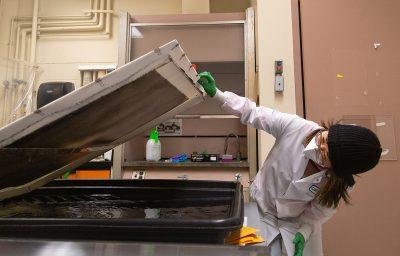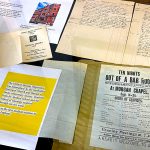Lucy Kim, an associate professor at Boston University’s College of Fine Arts, achieved the “Creative Capital Award” grant for developing the Melanin Images via Genetically Modified E. coli project, which brings themes of contrast and antiracist thinking to a wider audience.

“By developing a unique process for creating screen prints from melanin produced by genetically modified E. coli, I am exploring human pigmentation and the disingenuous use of vision to justify racial categories and inequities,” Kim wrote in an email.
The “Creative Capital Award” grants up to $50,000 to approximately 50 recipients to aid in career and project development. Creative Capital aims to recognize diverse artists in age, gender, ethnicity and artistic discipline.
Kim plans to use the grant to advance her project to completion.
Inspired to combine biology and visual art, Kim began screen printing strains of E. coli onto paper. Guillermo Gosset of the National Autonomous University of Mexico created the strain of E. coli she uses in her project.
The bacteria produces melanin, the pigment that gives skin its range of color. After culturing the bacteria for three days, Kim kills the growth. When the bacteria dies, a set image forms a monochromatic scale of black, brown or white.
“In the end, the final image has the distortions of life and death in it,” said Kim.
Abby Fenn, the current lab assistant to Kim, has worked with Kim since her freshman year at BU. As a student, Fenn became interested in Kim’s melanin project and inquired to become an assistant on the project.
“My own work is very experiment based,” Fenn said. “The idea of really doing experiments like in the lab research setting was very interesting to me.”
The melanin project is a learning process that keeps developing over time, Kim said. Both having little background in science and lab work, Fenn and Kim are constantly working out kinks and researching new methods to complete the project.
“I’m constantly learning,” said Kim. “I feel like a student sometimes with my students.”
Dana Clancy, director of the School of Visual Arts, said CFA recruited Kim for her “ability to work between different kinds of material and media,” and “engage different artistic communities.”
“I think that sense of engaging with hybridity, different forms of not just making but thinking is really interesting in Lucy’s work,” said Clancy.
Clancy also highlighted Kim’s work to start important conversations about antiracism through her art.
“The work that she’s doing at BU in relation to advocacy for inclusive pedagogy is something we want to do to be an excellent school across the board,” she said.
By comparing the photographic value systems to the ranking of caste systems in relation to skin tone, Kim’s deep understanding of categorization and oppression is highlighted, Clancy said.
“Visual arts engage with all kinds of different forms of research,” said Clancy. “That’s a strength that she brings.”
Kim said she believes “art is human” and can “enrich and facilitate” discussions about intense topics such as antiracism.
“I love chasing any kind of lead, especially if it’s through making things. I find it to be a way to think and respond about all things, grand or small, using your whole body, especially your senses,” Kim wrote in an email.















A respected professor, with wonderful inventions. Today’s tool lines are in need of even more conservation.